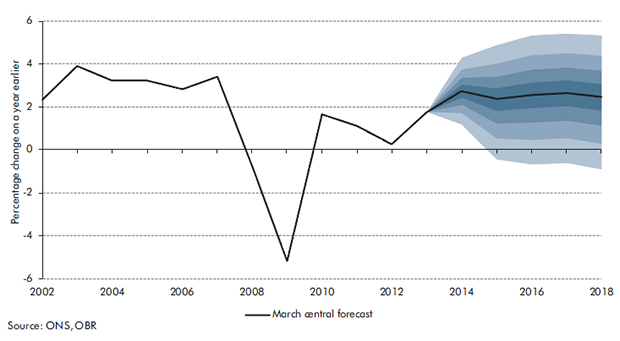The state of IT jobs in the UK

With the UK economy emerging from recession and computer technology a mission-critical component in almost every sector, the general forecast for IT job-seekers should be good. However, there are underlying and interconnected trends in the workforce and the way IT is implemented that will shape the industry's longer-term evolution and therefore the career prospects it can offer.
The UK economy
In his last budget speech in March 2014, UK Chancellor of the Exchequer George Osborne announced the official forecasts for the UK economy from the Office for Budget Responsibility (OBR). These included predicted GDP growth rates of 2.7 percent in 2014, 2.3 percent in 2015, 2.6 percent in 2016 and 2017, and 2.5 percent in 2018. There is, of course, considerable uncertainty about any economic forecast, as the OBR acknowledges. Here's a chart from the OBR report showing the probability of different outcomes based on past official forecast errors:

What's clear is that, although the UK economy appears to be emerging from the 2008/9 recession, the recovery is by no means complete and could still be derailed by unexpected events.
The UK workforce
The nature of work has changed greatly in recent years, and will continue to evolve. IT, of course, is a major driver here: mobility, widespread connectivity and cloud computing are increasingly enabling a 'work anywhere, anytime' culture, and make it much easier for startups to get off the ground, for example. Another result of such 'pervasive computing', along with the rise of social media, big data and the Internet of Things (IoT), is a much more complex security/privacy landscape.
Trends that will affect the employment market in the medium-to-long term were identified in a March 2014 report from the UK Commission for Employment and Skills (CES) on The Future of Work: Jobs and Skills in 2030. Here are the CES's 13 key disruptors of the future job market in infographic form:
There are clear pointers here to the long-term shape of the IT jobs market, which will undoubtedly value skills in areas such as web and mobile app development, cloud computing, data science, social media management, mobile technology and information security.
The UK IT industry
Another March 2014 UK CES report, Working Futures 2012-2022, looks at medium-term trends and explicitly covers the IT industry. Discussing the 'drivers of occupational change', the report notes that although ICT (Information and Communications Technology) has displaced many traditional clerical and secretarial jobs, it has also opened up new markets for previously unavailable information services and created opportunities for employees with higher-level skills.
In its detailed projections from 2012 employment levels, the report forecasts that the IT sector, along with Electricity & gas and Construction, will be the strongest performers, growing by 15 percent or more between 2012 and 2022. No fewer than 17 occupational categories within IT are expected to see growth exceeding 20 percent in this period, although only two — 'corporate managers and directors', and 'science, research, engineering and technology professionals' — either already employ over 100,000 people or are projected to do so by 2022.
So much for government-level statistics and projections. What about the current state of the UK IT jobs market 'on the ground', so to speak? To get an idea of what's available, we took a snapshot of the leading jobs search engine Adzuna. When we looked, on 29 August, Adzuna listed 93,375 IT jobs, with an average salary of £45,756 — a satisfyingly high figure, that also appears to be on the rise:
Prominent IT categories on the day in question covered data science (e.g. SQL, Sybase, data architect, data mining), software engineering and web development (e.g. web design, CSS, PHP, XML) and social media. There were also plenty of 'traditional' IT posts listed, as well as significant numbers of jobs in mobile app development and UI design, and information security. (Incidentally, in September 2013 Adzuna used its data to evaluate the UK's best and worst jobs, scoring them on 25 criteria including earning potential, working conditions, competitiveness, unemployment rates and job security. Web developers may have been startled to get top-equal billing with translators for the best job, closely followed by surgeons and lawyers.)
Although the IT jobs market in the UK looks buoyant in the short term for suitably qualified applicants, there's little cause for complacency in the industry: the combination of an ageing workforce and a recent decline in the number of computer science undergraduates (see chart below) points to a future skills gap (see also Microsoft's recent report). This is something the UK government is aware of and is addressing with a £500,000 fund for training teachers in software coding, the Year of Code initiative to enthuse youngsters about coding, and a new computing curriculum that kicks off in schools this month (September 2014).
IT skills for 2015 and beyond
We've noted that 'hot' IT subject areas in the coming years will include web and mobile app development, cloud computing, data science, social media management, mobile technology and information security. There will still be plenty of jobs in 'traditional' sectors like in-house IT infrastructure management and helpdesk services, but if you're looking to build a career in IT over the next decade or so, the former areas are the ones to concentrate on. But what particular skills should you bring to the table?
Web & mobile app development
As applications become more web-based and mobile focused, so the desirable software development skillset changes, with web application frameworks — such as ASP.Net, Java/J2EE and Ruby — and the fast-changing array of mobile app development options, including native SDKs (principally iOS and Android), HTML5, MADPs (mobile application development platforms) and MBaaS (mobile back-end-as-a-service) gaining greater currency. Some familiarity with the concepts and practices of Agile software development and DevOps will be useful, too.
User experience design/engineering
Increasing mobility requires the delivery of apps and services to a range of small screens — tablets, smartphones and, in future, wearable devices such as smartwatches. As well as orchestrating the underlying functionality, it's vital to create an efficient user experience, or UX — something that encompasses much more than just the user interface (UI). Indeed, good UX design is an essential precursor for an effective UI. 'UX designer' (or engineer, developer, architect) will be an in-demand skill over the next few years.
Data science
The volume, variety and velocity of 'big' data that companies can access — and potentially use to create a competitive edge — will provide plenty of job opportunities under the general banner of data scientist (this could also include 'database administrator' and 'business intelligence analyst', among other titles). Such people will have the statistical and analytical skills to harness disparate, often unstructured, data sources and, equally importantly, interpret the results for the company's business decision-makers. Hadoop is the dominant product in this area, along with other leading NoSQL databases such as MongoDB, Cassandra, DynamoDB and Couchbase. As data flows from the IoT ramp up, the demand for data scientists can only increase further.
Cloud migration/management
As businesses seek to move ever more business processes and workloads to the cloud, IT management becomes less concerned with looking after physical in-house infrastructure and more with orchestrating virtual servers, storage and networks, both in-house and — via WAN links — in remote cloud datacentres. This not only requires competence in the nitty-gritty of virtualisation platforms, cloud stacks and automated configuration tools such as Chef and Puppet, but also higher-level cloud broker/architect-type skills, which will help the IT department to ensure that its activities are properly aligned with the business's goals.
Information security
Business and personal data is spreading out across the cloud and is accessed on ever more mobile devices, all of which makes security and privacy more important than ever. And that's before the IoT starts putting all manner of 'things' — including our homes and elements of critical national infrastructure — online. The UK government has identified a potentially critical skills gap in information security, and is implementing a series of remedial measures, including GCHQ-certified Master's degree courses in cybersecurity.
Social media management
Social media is a vital component of many businesses' marketing and lead-generation strategies, and suitably skilled employees are likely to be in demand for the foreseeable future. Social media managers will need to be all-rounders, combining a mixture of traditional marketing skills, familiarity with a range of social media platforms, plus good creative, writing, analytical and networking skills.